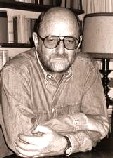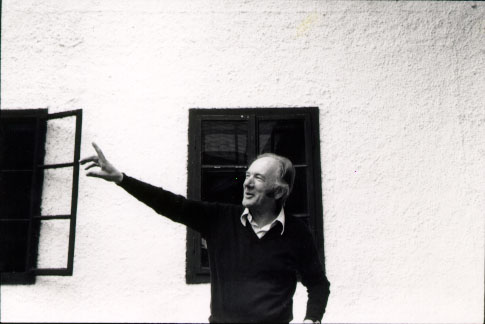Views of an incorrigible utopian
translated by Anja Zeidler

photo © Doralies Hüttner
*
Salzburg is a small town, beautiful, but the entrails, gruesome you know. If you grew up there you can’t forget that.
*
Are you thirsty maybe? But I can’t offer you anything, anyway.
*
"Die Kälte" ["The Cold" in Gathering Evidence]: I think is a really good book. Some time ago I re-read it from beginning to end, everything in place in that book. Nevertheless, I always say to myself how much more gruesome and horrible things were those days in the tuberculosis sanatorium, one could never write it down – did you notice: not a single doctor has a name. That’s because the sanatorium’s name was Grafenhof. The medical superintendant’s name was Edelmüller [Edelmann=nobleman]), his assistant’s Prinz [prince] and the assistant doctor’s Graf [count]. You can’t put that into a book. The book would’ve been spoiled. You have to work as economically as possible, like a composer, it still has to have an effect. That’s art.
*
All the things I described are really gruesome, but if it’s successful it’s a pleasure to write them down nevertheless.
*
I never in my life freed myself by writing. If I had done that nothing would be left. And what would I do with the freedom I gained? I’m not in favour of liberation, of relief. The cemetery, maybe that’s it. But, no, I don't believe in that either, because there would be nothing then.
*
I need not invent anything. Reality is far worse. Because I deal with people here in the village, and I know what they go through, I know when they sleep, what they eat, when they get cancer. There are many paper-mills around this area, and thus a lot of crippled people due to the machines which cut off their fingers or arms or ear lobs. By and by the machines cut off every part. Or you drive your motorcycle over the rails. And then you lose your leg. Like the man who formerly owned my farm. He used up an enormous lot of himself.
*
I was spared with my illness for over thirteen years. Three weeks ago the tumour in my lungs reappeared. Stage two, it could have been worse. There is also a third stage. That would’ve been it. Then my lungs would have collapsed and that means death. The first two weeks I had to undergo a severe cortisone treatment. You have the feeling to explode inside, but since a few weeks ago, less cortisone. Now all I want is to get healthy again.
*
To feel contempt for the people is stupid of course. But you have to be cautious, for the people will attack you because you are not like them: “He takes walks all day. He needs to be picked off!” But it’s a never-ending yearning to belong to the people. And the so-called simple people always have a better understanding of my writing than others.
*
If you're dying of thirst, tell me, I’ll get some water.
*
Shakespeare, Dostoyevsky, Tolstoy, Proust, I can’t do that. They are all great. A firmament. But one still has a lot of energy: something is still simmering. That’s a soup, which will never be done. One stirs and stirs and stirs. I have the feeling that what I’m doing is worth doing, otherwise I couldn’t do it.
*
Nowadays Kreisky [Chancellor of Austria from 1970 to 1983] is a fool blind with rage, lashing out, insulting people, being awkward, fat. Three, four stout men with pig’s heads, one hundred percent adipose supervising, controlling and wasting everything here in Austria. It’s similar in Germany. But they are not as stout and chubby, a bit slimmer, otherwise the same. Even a Helmut Schmidt [Federal Chancellor of West Germany from 1974 to 1982] is not the right thing, sailor, ahoy, he can only sing his song from a sinking ship.
*
You have to publish, so that you’re done with what you have to say. Or you destroy everything, burn it in the oven. Just like my mother out of rage burnt the one photo of my father, I burnt whole novels. No great loss.
*
My farmstead here was nothing but a ruin, totally rotten and decayed. I liked that. And then I said I’m going to renovate it. I did it with a man whose name was Ferdl. A small old man. They buried him the day before yesterday. He was my dearest companion. Cancer of the stomach. For two years he had said: “There is something inside, something that bites.” I thought I’ve to write something someday, write a book called “Ferdl.”
*
The human being refuses to believe that nature is far greater than a heart beat. A meadow full of flowers is such an elementary thing that one chokes with wonder thinking about it. But it will all be lost except for some cretin-like creatures. Maybe then there really will be something new.
*
I always vary, alternate, after a piece of prose a piece for the theatre, so that that will be fresh again. What is so attractive with the theatre are the people with whom you work. Writing prose you’re alone. You send it to the publisher, he writes back something stupid, then you don’t hear anything anymore, and then you get a sloppily printed book with millions of mistakes you yourself had struggled to correct, and you get hardly any money anyway. Working with the theatre is different. Though after some weeks it all goes on my nerves, all those gruesome actors. Then I’m relieved to be able to get back to prose. Then I again manage alone for months.
*
Do you want a schnapps, my neighbour produces it in his own distillery.
*
You
won’t find books here. I don’t know anybody who reads less
than I do. And I only deal with people who hardly read anything. Books
are spooky, strangling.
